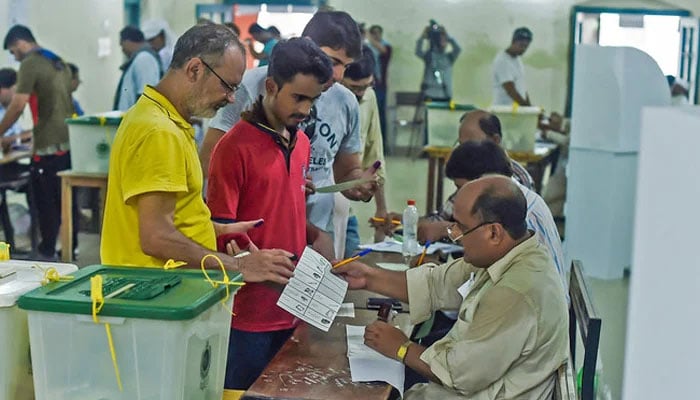Experimenting with democracy
A national government is neither a solution to Pakistan’s current problems nor a viable way forward
One of the seasons in Pakistan is the season of ‘national government’ – a time when everyone suddenly and without any prompt starts talking about a ‘national government’ that will change the course of Pakistani politics and democracy and fix everything. Just as suddenly, the season shifts as well. We are currently experiencing National Government Season – emblematic of a troubled political system. From speculative statements by politicians to lofty suggestions by analysts, the idea always seems to generate considerable buzz. This time too it has the usuals propping it up as a solution. Most dismiss it as wishful thinking by those left out of the corridors of power, as well as a calculated attempt to ‘test the waters’ – which, to be fair to Pakistan’s politics, have never passed the national government test. Here’s a simple fact: a national government is neither a solution to Pakistan’s current problems nor a viable way forward. Proponents of the national government theory argue that it is necessary to resolve the political tensions that have gripped the country since the no-confidence vote against former prime minister Imran Khan two years ago. They believe that Pakistan’s precarious political climate demands a government that includes representatives from all major political parties, including the PTI, and that such a setup would de-escalate tensions and pave the way for fresh elections.
Critics rightly point out the fundamental flaws in this approach. There is no evidence to suggest that a national government would succeed where others have failed. On the contrary, such an arrangement risks further entrenching the hybrid governance model that has undermined Pakistan’s democratic institutions. The country’s history is littered with experiments in governance – military coups, technocrat setups, or other non-democratic solutions. None have yielded long-term stability or prosperity. The ‘Bangladesh model’ frequently touted by proponents of technocratic regimes has always been a non-starter. The suggestion of a national government in Pakistan often comes with caveats that raise eyebrows in any case and, far from being a unifying force, a government of this nature could deepen political divisions and further erode public trust in democratic institutions.
What Pakistan truly needs is not another grand experiment in governance but a genuine commitment to political dialogue. Encouragingly, reports suggest that senior PTI leader Asad Qaiser and National Assembly Speaker Ayaz Sadiq have taken steps to reduce political tensions. This thaw could serve as a foundation for meaningful negotiations, offering a much-needed path forward. At the heart of these discussions must be a commitment to addressing the structural issues plaguing Pakistan’s democracy. This includes ensuring free and fair elections, empowering an independent and non-controversial election commission, safeguarding the judiciary’s independence, and ending the practice of political victimisation through legal cases. Perhaps most importantly, political actors must build a consensus on economic reforms to prevent the country’s growth from being held hostage by political expediency. The hybrid model of governance has already cost Pakistan dearly, leading to unprecedented political polarisation and the erosion of fundamental freedoms. Adding another layer to this experiment in the form of a national government would only exacerbate these problems. It is time to reject undemocratic solutions and focus instead on strengthening what remains of Pakistan’s democratic framework.
-
 Hilary Duff’s Son Roasts Her Outfit In New Album Interview
Hilary Duff’s Son Roasts Her Outfit In New Album Interview -
 Alexandra Daddario, Andrew Form Part Ways After 3 Years Of Marriage
Alexandra Daddario, Andrew Form Part Ways After 3 Years Of Marriage -
 Eric Dane Rejected Sex Symbol Label
Eric Dane Rejected Sex Symbol Label -
 Avan Jogia Says Life With Fiancee Halsey Feels Like 'coming Home'
Avan Jogia Says Life With Fiancee Halsey Feels Like 'coming Home' -
 Kate Middleton's Role In Handling Prince William And Harry Feud Revealed
Kate Middleton's Role In Handling Prince William And Harry Feud Revealed -
 Tucker Carlson Says Passport Seized, Staff Member Questioned At Israel Airport
Tucker Carlson Says Passport Seized, Staff Member Questioned At Israel Airport -
 David, Victoria Beckham Gushes Over 'fiercely Loyal' Son Cruz On Special Day
David, Victoria Beckham Gushes Over 'fiercely Loyal' Son Cruz On Special Day -
 Taylor Swift Made Sure Jodie Turner-Smith's Little Girl Had A Special Day On 'Opalite' Music Video Set
Taylor Swift Made Sure Jodie Turner-Smith's Little Girl Had A Special Day On 'Opalite' Music Video Set -
 Eric Dane Says Touching Goodbye To Daughters Billie And Georgia In New Netflix Documentary
Eric Dane Says Touching Goodbye To Daughters Billie And Georgia In New Netflix Documentary -
 Channing Tatum Reveals What He Told Daughter After Violent Incident At School
Channing Tatum Reveals What He Told Daughter After Violent Incident At School -
 King Charles Lands In The Line Of Fire Because Of Andrew Mountbatten-Windsor
King Charles Lands In The Line Of Fire Because Of Andrew Mountbatten-Windsor -
 Denise Richards Doubles Down On Abuse Claims Against Ex Husband Aaron Phypers Amid Show Return
Denise Richards Doubles Down On Abuse Claims Against Ex Husband Aaron Phypers Amid Show Return -
 Russia Set To Block Overseas Crypto Exchanges In Sweeping Crackdown
Russia Set To Block Overseas Crypto Exchanges In Sweeping Crackdown -
 Gwyneth Paltrow Reveals Deep Personal Connection With Kate Hudson
Gwyneth Paltrow Reveals Deep Personal Connection With Kate Hudson -
 Prince Harry, Meghan Markle’s Game Plan For Beatrice, Eugenie: ‘Extra Popcorn For This Disaster’
Prince Harry, Meghan Markle’s Game Plan For Beatrice, Eugenie: ‘Extra Popcorn For This Disaster’ -
 OpenAI To Rollout AI Powered Smart Speakers By 2027
OpenAI To Rollout AI Powered Smart Speakers By 2027




